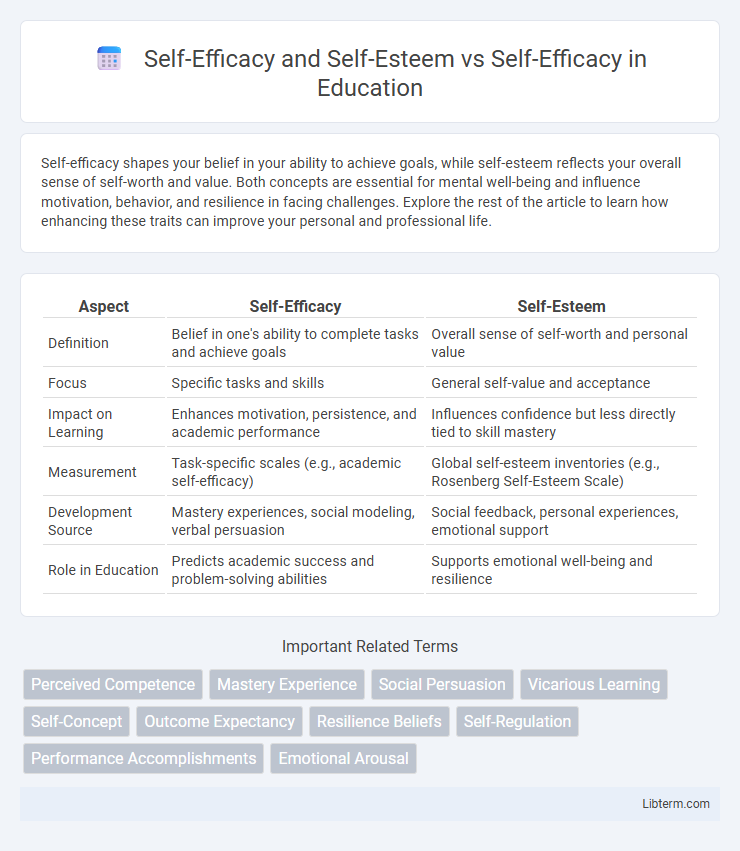Self-efficacy shapes your belief in your ability to achieve goals, while self-esteem reflects your overall sense of self-worth and value. Both concepts are essential for mental well-being and influence motivation, behavior, and resilience in facing challenges. Explore the rest of the article to learn how enhancing these traits can improve your personal and professional life.
Table of Comparison
| Aspect | Self-Efficacy | Self-Esteem |
|---|---|---|
| Definition | Belief in one's ability to complete tasks and achieve goals | Overall sense of self-worth and personal value |
| Focus | Specific tasks and skills | General self-value and acceptance |
| Impact on Learning | Enhances motivation, persistence, and academic performance | Influences confidence but less directly tied to skill mastery |
| Measurement | Task-specific scales (e.g., academic self-efficacy) | Global self-esteem inventories (e.g., Rosenberg Self-Esteem Scale) |
| Development Source | Mastery experiences, social modeling, verbal persuasion | Social feedback, personal experiences, emotional support |
| Role in Education | Predicts academic success and problem-solving abilities | Supports emotional well-being and resilience |
Understanding Self-Efficacy: Definition and Importance
Self-efficacy refers to an individual's belief in their capability to execute actions required to manage prospective situations effectively, significantly influencing motivation and behavior. It differs from self-esteem, which reflects overall self-worth rather than task-specific confidence. Understanding self-efficacy is crucial for enhancing performance, resilience, and goal achievement across various domains such as education, health, and professional development.
Defining Self-Esteem: A Core Component of Self-Perception
Self-esteem is a fundamental component of self-perception, reflecting an individual's overall sense of self-worth and personal value. It differs from self-efficacy, which specifically pertains to one's belief in their ability to accomplish tasks and achieve goals. While self-efficacy influences motivation and actions, self-esteem shapes emotional well-being and the perception of one's intrinsic worth.
Key Differences between Self-Efficacy and Self-Esteem
Self-efficacy refers to an individual's belief in their ability to succeed in specific tasks, while self-esteem reflects a broader sense of self-worth or value. Self-efficacy is task-specific and linked to motivation and performance, whereas self-esteem encompasses overall feelings of self-acceptance and confidence. Understanding the distinction helps tailor personal development approaches, focusing on skill mastery (self-efficacy) versus self-acceptance (self-esteem).
The Interplay: How Self-Efficacy Influences Self-Esteem
Self-efficacy shapes self-esteem by reinforcing individuals' beliefs in their capabilities, leading to increased confidence and positive self-regard. Empirical studies reveal that higher self-efficacy enhances resilience against failure, which strengthens overall self-esteem and psychological well-being. The dynamic interplay suggests that self-efficacy serves as a foundational component driving the development and maintenance of robust self-esteem across diverse contexts.
Measuring Self-Efficacy in Real-World Scenarios
Measuring self-efficacy in real-world scenarios involves assessing individuals' confidence in specific tasks and their ability to overcome challenges within practical contexts, distinguishing it from global self-esteem which reflects overall self-worth. Tools such as task-specific surveys, behavioral observations, and performance assessments provide accurate indicators of self-efficacy by capturing situational confidence and capability. Emphasizing contextual factors ensures that self-efficacy measurements predict motivation and persistence more effectively than generalized self-esteem metrics.
The Role of Self-Esteem in Personal Development
Self-esteem significantly influences personal development by shaping how individuals perceive their worth and capabilities, which directly impacts their motivation and resilience. While self-efficacy reflects belief in specific abilities to accomplish tasks, self-esteem provides the broader emotional foundation that supports this confidence, fostering a positive self-concept essential for growth. Enhancing self-esteem promotes greater self-efficacy, enabling more effective goal-setting and perseverance in face of challenges.
Self-Efficacy vs Self-Eesty: Common Misconceptions
Self-efficacy and self-esteem are often mistakenly used interchangeably, but self-efficacy refers to one's belief in their ability to accomplish specific tasks, while self-esteem reflects overall self-worth and value. Misconceptions arise when people assume high self-esteem automatically means strong self-efficacy, yet an individual can have confidence in specific skills despite low global self-regard. Understanding this distinction is crucial for psychological interventions targeting motivation, as enhancing self-efficacy involves building task-specific competencies rather than solely boosting general self-esteem.
Building Self-Efficacy: Practical Strategies and Tips
Building self-efficacy involves setting achievable goals, engaging in positive self-talk, and embracing challenges to foster a sense of mastery and competence. Practical strategies include breaking tasks into manageable steps, seeking constructive feedback, and observing role models to boost confidence in abilities. Emphasizing consistent practice and resilience strengthens self-efficacy more effectively than focusing solely on self-esteem, which centers on overall self-worth rather than specific capability beliefs.
Nurturing Healthy Self-Esteem for Lifelong Confidence
Nurturing healthy self-esteem is essential for fostering lifelong confidence, as it provides a stable foundation for self-efficacy, which is the belief in one's ability to succeed in specific tasks. High self-esteem enhances motivation and resilience, enabling individuals to effectively harness their self-efficacy in various life challenges, thereby improving overall psychological well-being. Building self-esteem through positive reinforcement, self-compassion, and supportive social environments catalyzes the development of robust self-efficacy, leading to sustained personal growth and achievement.
Integrating Self-Efficacy and Self-Esteem for Success
Integrating self-efficacy and self-esteem enhances personal success by combining belief in one's capabilities with overall self-worth, fostering stronger motivation and resilience. High self-efficacy empowers individuals to tackle challenges confidently, while elevated self-esteem provides emotional stability and a positive self-image. Together, these constructs create a synergistic effect that improves goal achievement and psychological well-being.
Self-Efficacy and Self-Esteem Infographic

 libterm.com
libterm.com